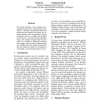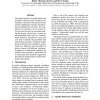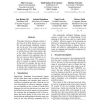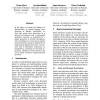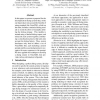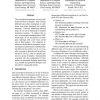SIGDIAL
2010
13 years 10 months ago
2010
This paper introduces a new dialogue management framework for goal-directed conversations. A declarative specification defines the domain-specific elements and guides the dialogue...
SIGDIAL
2010
13 years 10 months ago
2010
Two of the main corpora available for training discourse relation classifiers are the RST Discourse Treebank (RST-DT) and the Penn Discourse Treebank (PDTB), which are both based ...
SIGDIAL
2010
13 years 10 months ago
2010
This paper presents an agenda-based user simulator which has been extended to be trainable on real data with the aim of more closely modelling the complex rational behaviour exhib...
SIGDIAL
2010
13 years 10 months ago
2010
This paper presents a dialogue system in the form of an ECA that acts as a sociable and emotionally intelligent companion for the user. The system dialogue is not task-driven but ...
SIGDIAL
2010
13 years 10 months ago
2010
This paper proposes a novel approach for predicting user satisfaction transitions during a dialogue only from the ratings given to entire dialogues, with the aim of reducing the c...
SIGDIAL
2010
13 years 10 months ago
2010
In spoken communications, correction utterances, which are utterances correcting other participants utterances and behaviors, play crucial roles, and detecting them is one of the ...
SIGDIAL
2010
13 years 10 months ago
2010
In this paper we examine the influence of dimensionality on natural language route directions in dialogue. Specifically, we show that giving route instructions in a quasi-3d envir...
SIGDIAL
2010
13 years 10 months ago
2010
SIGDIAL
2010
13 years 10 months ago
2010
In this paper we present a proposal for the development of dialog systems that, on the one hand, takes into account the benefits of using standards like VoiceXML, whilst on the ot...
SIGDIAL
2010
13 years 10 months ago
2010
The second person pronoun you serves different functions in English. Each of these different types often corresponds to a different term when translated into another language. Cor...
